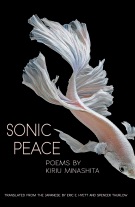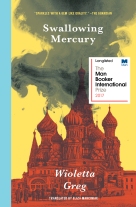September 4, 2018—The American Literary Translators Association (ALTA) is pleased to announce the shortlists for the 2018 National Translation Awards (NTA) in Poetry and Prose! 2018 marks the twentieth year for the NTA, and the fourth year to award separate prizes in poetry and prose. The NTA, which is administered by ALTA, is the only national award for translated fiction, poetry, and literary nonfiction that includes a rigorous examination of both the source text and its relation to the finished English work.
This year’s judges for poetry are Kareem James Abu-Zeid, Jennifer Feeley, and Sawako Nakayasu. This year’s prose judges are Esther Allen, Tess Lewis, and Jeremy Tiang.
The winning translators will receive a $2,500 cash prize each. The awards will be announced at ALTA’s 41st annual conference, held this year at the Indiana Memorial Union at Indiana University in Bloomington, IN from October 31 – November 3, 2018. In the meantime, ALTA will highlight each book on the longlists and shortlists with features written by the judges in a countdown to the conference here on the ALTA blog. Follow our Twitter (@LitTranslate), or Facebook (www.facebook.com/literarytranslators) for the announcements of the winners, and register for the conference to see these announcements live in Bloomington: http://literarytranslators.org/conference/alta41-2018/registration.
The 2018 NTA Shortlist in Poetry (in alphabetical order by title):
 Directions for Use
Directions for Use
by Ana Ristović
translated from the Serbian by Steven Teref and Maja Teref
(Zephyr Press)
Ana Ristović’s first book in English translation is long overdue – elsewhere in the world she has already found her audience. Steven Teref and Maja Teref team up to bring us this singular feminist voice in contemporary Serbian poetry, while providing crucial context to a Ristović-specific audacity tucked beneath the surfaces of what at first blush feels charming and wittily domestic. This book traffics in the “directions” and “uses” of cities, vehicles, houses, and interiorities of the body – in particular, the sensual landscapes here are disarming and fresh – “my soul sewed/a chatty vulva on me with invisible thread.”
 Hackers
Hackers
by Aase Berg
translated from the Swedish by Johannes Göransson
(Black Ocean)
The hard, jagged edges of Aase Berg’s postfeminist language are at once minimal, futuristic, scrappy, and hag-like – impatiently hacking away at long-failed systems of patriarchy and capitalism and other systems equally in need of eradication at the molecular level. Johannes Göransson’s translation is appropriately queer, and a tremendous success: it leaves the reader with nowhere to hide. It’s an unsettling book for exactly these times – as troubled as we are by what it uncovers, in some terrifying and lucid way, Berg and Göransson suggest, through this work, to love only if we love fiercely – and we do need that.
 I Remember Nightfall
I Remember Nightfall
by Marosa di Giorgio
translated from the Spanish by Jeannine Marie Pitas
(Ugly Duckling Presse)
Prominent Uruguayan poet Marosa di Giorgio conjures up an off-kilter nocturnal world where the unearthly becomes mundane and the impossible becomes possible. These poems are sensuous, enchanting, delicate, and beautiful, as well as disorienting, unsettling, chilling, and macabre. The remembered gardens of her hallucinatory nightmarescapes are infested with sinister flowers, suffocating tulle, rotting corpses, crazed flora and fauna, the cloying perfume of flowers and fruits, and various supernatural beings. No one or nothing is to be trusted. Jeannine Marie Pitas’s haunting English translation captures di Giorgio’s peculiar syntax, deceptively simple language, and urgent rhythms.
 The Odyssey
The Odyssey
by Homer
translated from the Greek by Emily Wilson
(W. W. Norton & Company)
Emily Wilson’s fresh take on this ancient Homeric epic is both scholarly exacting and a pleasure to read. Rendered into a colloquial iambic pentameter that matches the same number of lines as the Greek hexameters, her buoyant rhythms and fresh, vivid imagery weave a gripping, brisk-paced narrative that is hard to put down. Wilson’s efforts can also be considered an intervention to slough off the anachronistic biases and oversimplifications found in many previous translations. The result is a work that is crisp, forceful, daring, and nuanced, a monumental rendering of a monumental text, “an old story for our modern times.”
 Sonic Peace
Sonic Peace
by Kiriu Minashita
translated from the Japanese by Spencer Thurlow and Eric Hyett
(Phoneme Media)
Eric E. Hyett and Spencer Thurlow’s electrifying translation of Kiriu Minashita’s award-winning poetry collection envisions a technology-driven, rain-soaked Tokyo in which everything and everyone is mass-produced, interchangeable, and comes with a price tag. Minashita is interested in exploring the limits of language, particularly the act of naming and what ends up lost in this process, revealing the porousness of the boundaries between the genuine and the counterfeit. Hyett and Thurlow find innovative solutions to recreate Minashita’s playful linguistic subversions, emphasizing the sonic quality of certain words and phrases to distinguish sound from meaning.
 Third-Millennium Heart
Third-Millennium Heart
by Ursula Andkjær Olsen
translated from the Danish by Katrine Øgaard Jensen
(Action Books)
Danish poet Ursula Andkjær Olsen’s compelling work travels through dark chambers of desire, power, and creation, conjuring up a feminist space where culture and nature wage war with one another, where psychology and anatomy merge to create a uniquely modern mytho-poetics. Katrine Øgaard Jensen’s masterful translation has a strong rhythm all its own, and captures the book’s jarring quality in a remarkably smooth rendering. By the end of this insidious text, the reader is just as “namedrunk” as the book’s enigmatic lyrical subject, and discovers that their own “heartspace,” too, has been torn open, dissected, and beautifully recreated.
The 2018 NTA Shortlist in Prose (in alphabetical order by title):
 Compass
Compass
by Mathias Énard
translated from the French by Charlotte Mandell
(New Directions)
This virtuosic and engaging meditation on how the ‘Orient’ has shaped Western thought and art and been shaped in turn is also a love letter to countries and cultures that have been damaged nearly beyond recognition. Over the course of a sleepless night, a Viennese musicologist broods over an ominous diagnosis and recalls with bittersweet wryness his unrequited love for Sarah, a brilliant scholar of Middle Eastern cultures. He punctuates his monologue with adventures and misadventures of a colorful cast of historical figures. Charlotte Mandell conveys the exhilaration, complexity and intellectual relish of Énard’s prose with every ounce of the original’s energy.
 Dandelions
Dandelions
by Yasunari Kawabata
translated from the Japanese by Michael Emmerich
(New Directions)
Ineko has been diagnosed with “somagnosia” or “body-blindness” and her mother and lover have just left her at an insane asylum. As they walk away they can hear a temple bell in the distance and they know Ineko is ringing it. Kawabata’s final masterpiece—begun half a decade before he won the Nobel Prize in 1968 and left unfinished by his 1972 suicide—follows the conversation as mother and lover wander through late afternoon and into the night. Michael Emmerich’s flawless prose echoes out like the bell from the asylum as the narrative plummets along the knife-edge that divides things seen from those unseen.
 Ghachar Ghochar
Ghachar Ghochar
by Vivek Shanbhag
translated from the Kannada by Srinath Perur
(Penguin Books)
A compact book that packs a powerful punch. Compelling and sharply-observed, this portrait of a Bangalore family growing accustomed to sudden prosperity starts out with the trappings of a domestic comedy, only to lead us into murkier waters as their depravity is gradually laid bare. The oblivious narrator sails along willfully untroubled, and is deployed to brilliant effect — the family’s secrets cannot stay hidden, and what he leaves unsaid tells us much more than what he reveals. Vivek Shanbhag’s lively narrative voice is flawlessly rendered by Srinath Perur, whose translation zings with vivid energy and sinister depths.
 The Impossible Fairy Tale
The Impossible Fairy Tale
by Han Yujoo
translated from the Korean by Janet Hong
(Graywolf Press)
The first of Han Yujoo’s books to be published in English is unlike anything else in its fearless experimentalism, working a nightmare narrative of childhood anomie and psychosis into a metafictional meditation on the meaning of storytelling. Janet Hong’s breathtakingly supple translation of the Korean wordplay achieves the impossible, again and again.
 Old Rendering Plant
Old Rendering Plant
by Wolfgang Hilbig
translated from the German by Isabel Fargo Cole
(Two Lines Press)
The narrator of this slender but forceful book recalls a childhood spent in thrall to an old coal plant repurposed as a slaughterhouse in which animal fat is rendered. Forbidden to go near it, he nonetheless returns day after day, uncovering in each foray a bit more of the reality his community refuses to acknowledge but that nonetheless pervades the region as insistently as the stench from the plant. In sensuous, exuberant, but unsettling prose, Hilbig distills these childhood memories into an elixir that has more than a hint of toxicity. Isabel Cole Fargo’s translation sinuous, supple translation beautifully capture the original’s ominous tone.
 Swallowing Mercury
Swallowing Mercury
by Wioletta Greg
translated from the Polish by Eliza Marciniak
(Transit Books)
The dank, claustrophobic atmosphere of rural 1980s Poland is brilliantly evoked in Wioletta Greg’s debut collection, which balances on a knife-edge between the comforting and sinister. Beautiful, sensual images and details populate these stories of childhood, dizzying in their intensity and deployed with consummate skill. As the narrator grows older and innocence gives way to experience, mirroring the transformation of the country itself, the prose toughens and the wider world begins to intrude. Eliza Marciniak’s translation finds an earthy, expressive vocabulary that perfectly suits the headstrong protagonist and the rough-hewn world she lives in. A dark, fractured fairy tale.
